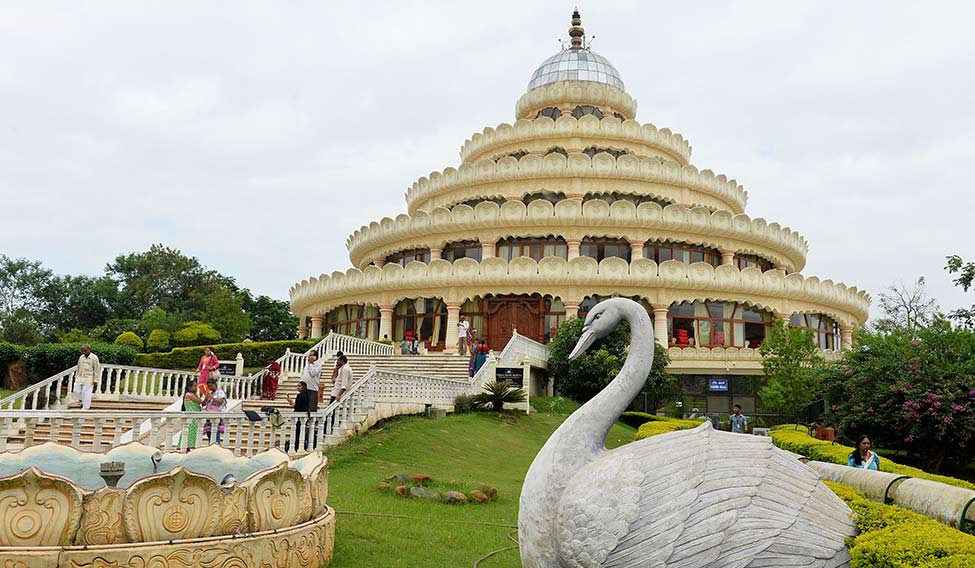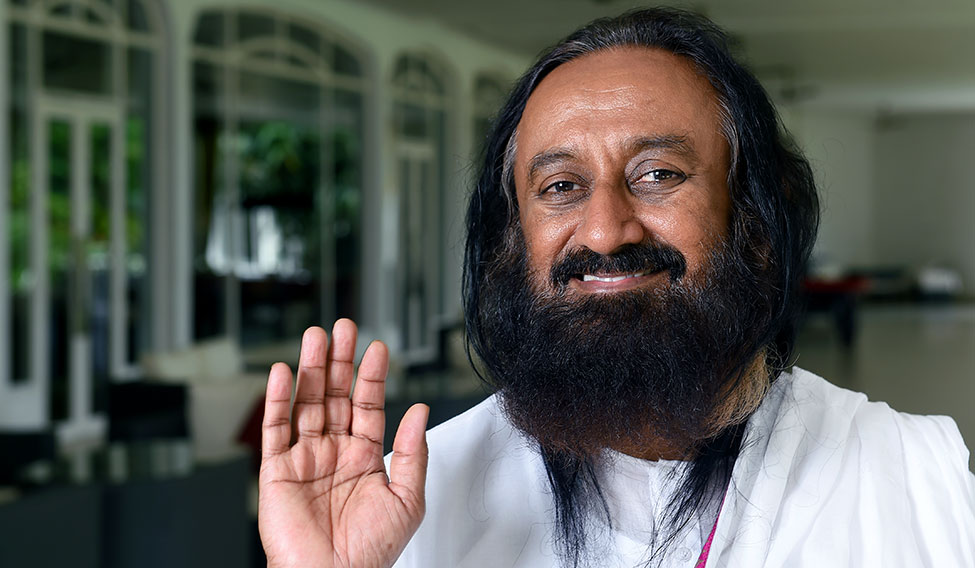An evening satsang at Vishalakshi Mantap in the lushgreen grounds of the Art of Living (AoL) International Center in Bengaluru is an electrifying experience reverberating with soulful music, ecstatic dance and soothing meditation.
The ashram is the nerve centre of AoL, a spiritual movement started by Sri Sri Ravi Shankar in 1981, which has touched 370 million lives across 155 countries.
A year after AoL came into being, Sri Sri Ravi Shankar—‘Sri Sri’ or ‘Gurudev’ to his disciples—went into silence for ten days in Shimoga, Karnataka. He perfected Sudarshan Kriya—a powerful breathing technique which continues to pump life into the movement, 36 years after it was conceived.
The stress management programmes, conflict resolution and social projects of AoL have gone global through its 11,600 centres and a network of volunteers serving across the globe.
In the age of neo-nationalism, rising conflicts, mass migrations and growing economic uncertainties, Indian spirituality is redefining a new value system—of universalism in nationalism.
Nationalism is nothing new, says Sri Sri; it is not a bad thing to be a nationalist. “America, Canada, UK, Italy and France have always been nationalist. But after the second World War, the Germans and the Japanese were made to feel that nationalism was bad. In India, the colonial rulers ensured that it was frowned upon. However, I believe that nationalism sans universalism is not good for humanity,” says Sri Sri, who prescribes multi-cultural education as a remedy for fanaticism.
Practices like yoga and meditation have taken giant strides in the global arena, and the UN has instituted the International Day of Yoga, June 21. More than 37,000 artistes and a battalion of world leaders attended the World Culture Festival organised by AoL on the banks of the river Yamuna in March 2016. The popularity of Indian spirituality in the western nations is neither accidental nor transient, contends Sri Sri.
“The western society is based on fear of sin and would not defy religious authority. To accept something new (like yoga and meditation) would have been unthinkable. Yoga must be from the devil, they thought. But secularism and pluralism are part of Indian spirituality as much as it is ingrained in the constitution of America,” says Sri Sri, who led the first International Day of Yoga at the UN headquarters in 2015.
Indian spirituality is embraced worldwide for its openness and the spirit of questioning, he says.
“Occidental philosophy teaches us to believe; experience will follow. One is asked not to question. But the oriental philosophy advocates one to experience first and then decide if you want to believe. This appeals to the scientific-minded,”reasons the guru.
“Our scriptures encourage us to debate and analyse. We have an entire text—Prashnopanishad on the mechanics, purpose and goal of questioning. It is not a blind faith. It is a celebration of the spirit of questioning,” elaborates Sri Sri, who graduated in both Vedic literature and physics.
The journey over the last 36 years was not a smooth one, confides the founder. “When I started AoL, people had this notion that yoga was for the ones with matted hair, who stood on one leg at the Allahabad Kumbh Mela. So, I had to go with the name ‘Art of Living’ to ensure its acceptance as something that went beyond religion. Today, there is a sea change in perception,” recounts Sri Sri.
“The concept of vasudhaiva kutumbakam (the world is one family) is embedded in Indian culture, he says. Sri Sri travels to at least 40 countries every year, reaching out to people in conflict zones, addressing parliaments, brokering peace and healing through yoga and meditation techniques. His commentaries on ancient Indian scripts have a huge following in the US, the UK and Germany.
AoL is involved in stress management programmes, humanitarian projects, conflict resolution, disaster relief and sustainable rural development programmes.
Annelies Richmond, who is the director of teacher training at AoL, has been with the organisation for 18 years. She says more people are seeking out AoL in the US as there is high stress, depression and anxiety.
Jeff Houk, an AoL teacher and president of International Association for Human Values (IAHV) in the US, says, “I first met Gurudev in 1987. AoL’s universality cuts across gender, politics, nationality, age and education.”
As peace ambassadors, Sri Sri and AoL are involved in trauma care programmes in war zones like Syria, Iraq and Afghanistan.
During the Kosovo conflict, European IAHV trainers held trauma-relief programmes for 700 disabled KLA victims, 105 refugees in the Plemetina camp and rape victims. Now, initiatives for social re-integration post-conflict are being held across seven prisons, reaching out to 1,500 prisoners and administrators.
The group undertook disaster relief work in the aftermath of numerous global disasters like Chile earthquake of 2010, Kashmir earthquake of 2005 and Hurricane Katrina in the US in the same year.
 Picture of bliss: Art of Living International Centre at Vishalakshi Mantap in Bengaluru | AFP
Picture of bliss: Art of Living International Centre at Vishalakshi Mantap in Bengaluru | AFP
“Refugees feel alien to the host nation and fear attacks. They live in a state of fear and insecurity. They are scared of losing their identity and culture and are afraid of being driven out. Spiritual exercises like meditation help them become more grounded,” says Sri Sri.
The group claims that Sri Sri’s mediation helped the peace process in Cuba with Revolutionary Armed Forces of Colombia (FARC) in August 2015. According to them, AoL ensured the rescue of 2,000 Yezidi girls from Islamic State’s captivity in Iraq.
AOL’s Prison SMART programme helps reduce stress, heal trauma and ward off negative emotions. Since 1990, it has been taught to 3,50,000 prisoners in 40 countries. AoL says many highly violent prisons are now seeing zero crimes.
“Prison inmates carry the past garbage in their minds and are full of anger and hatred. But spirituality heals,” says Sri Sri. AoL says courts in Denmark no longer send young criminals to prison but to AOL Youth Prison Programmes.
Says Beatriz V. Goyoaga, who has been working in Latin America for the last 20 years, “Our programmes are changing the attitudes, habits and way of life of people in Latin America—from the poor in the slums to politicians, academics, doctors and housewives.”
When Sri Sri last visited Argentina in 2012, close to 1,50,000 people gathered to meditate with him for world peace. Ten thousand people arrived at the airport to welcome him. “The president of Colombia, Juan Santos, thanked Gurudev for his role in the peace process that ended a 54-year civil war with the FARC rebels,” says Beatriz.
Perhaps it was the perils of a market-driven economy that led to the constitution of the International Association for Human Values in 1997, aiming to coordinate sustainable development projects.
“Earlier, spirituality for the business community was considered far-fetched. But today, we see many conferences on business and spirituality. If business lacks ethics, it will not be sustainable,” says Sri Sri.
AoL entered the FMCG space with the Sri Sri Ayurveda (SSA) brand in 2003, launching wellness and personal care products in health drink and foods, apparel, handicraft, oil and spices segments. They are sold through its 600 franchise outlets and online portal ‘Sattva Store’.
Christoph Glaser, who joined AoL in 1994 and is currently a board member, says, “We find that the world is becoming more volatile, uncertain, complex and ambiguous. We are entering the fourth industrial revolution. To balance this, meditation and spirituality are key.”
Choosing between environment protection and development is tough, but it is like riding a bicycle, says the guru. “You have to find the right balance.” The organisation claims that, through their green mission, they have planted 71 million trees in 36 countries and rejuvenated 27 rivers in India.
Asked about the relevance of spiritual pursuit in the modern age, Sri Sri narrates the ‘Doomsday’ fear that gripped the world in early 2000. “Panic struck even the most rational minds. Many sold off their property along the west coast of the US and moved to so-called safer havens,” he says. “People go through bad times. Spirituality provides you the inner strength and ability to withstand crises.”







